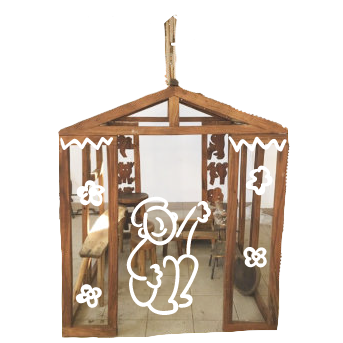


Rainy Yip 葉志明
誰的童年沒有玩過「起屋仔」?窩居的概念早出現在我們成長的集體記憶中。在家中建另一個小的家,幾兄妹在裡面扮演父母的角色,卻做著父母會呵責的生活碎事。「起屋仔」其實是個人生活起居夢想的投射。
Rainy的「起屋仔」的童年玩意記憶,延續駐留空間裡創造了更多的木屋仔,連結社區的廢木,細緻地增添了生活的全木日常器具。只有孩子進去才能活動自如的遊戲-父母只能在旁觀看的家。
曾經窺看過Rainy一個人靜靜在「起屋仔」,他本來就是個大孩子,身型高大,性情孩子氣,他艱難地在木屋堆裡爬來爬去,置身他童年未完成的遊戲,為自己也為孩子的遊戲。
我們現在「起屋仔」的夢想常是去看樓盤的示範單位,或去Ikea的家居商品單位中發夢一下,這是孩子不會就範的假空間。但一間真的屋仔就是一個認真的成長體驗,像Rainy的,瀝瀝在目。
Who didn't play "building house" in childhood? The concept of having your own home has long appeared in the collective memory, from which brothers and sisters build another small home at home, play the role of parents and blame someone for the mess of life. "Building house" is in fact a projection of personal dreams.
Rainy's childhood memories of "building house" led to a creation of wooden houses during the residence, turning the waste wood in the community into delicate wooden daily utensils. It was a game that can only be played freely by children, and their parents can only watch.
If one glanced at Rainy when he quietly built the "house," one could see he was a big and temperamental child. He climbed up and down in the wooden house, and put himself in the unfinished childhood games for himself and for kids.
Our dream of "building house" is often to go to the demonstration units of real estate, or go to Ikea's home furnishing units and dream about it. This is a unreal space where children will not give way, but a real house is a real growing up experience, like Rainy's.